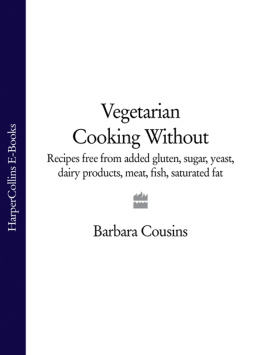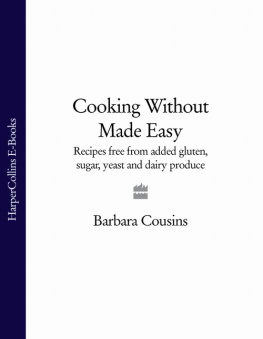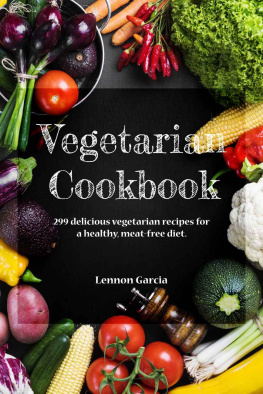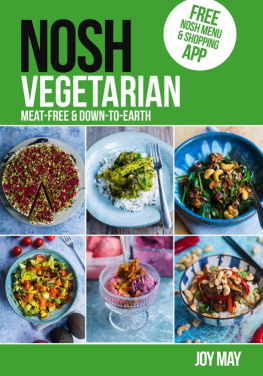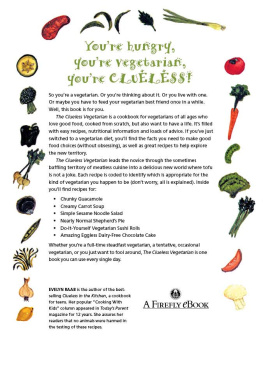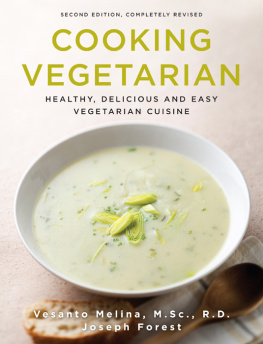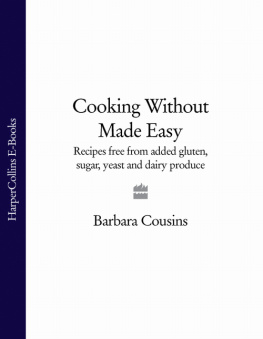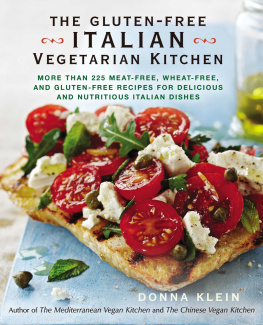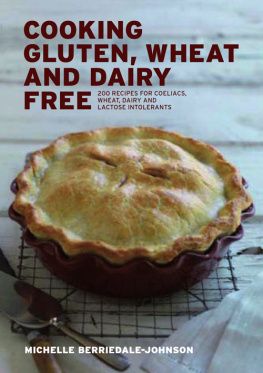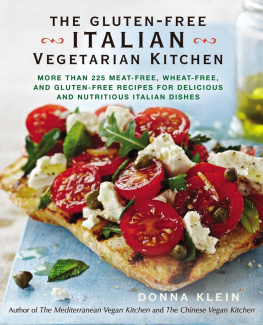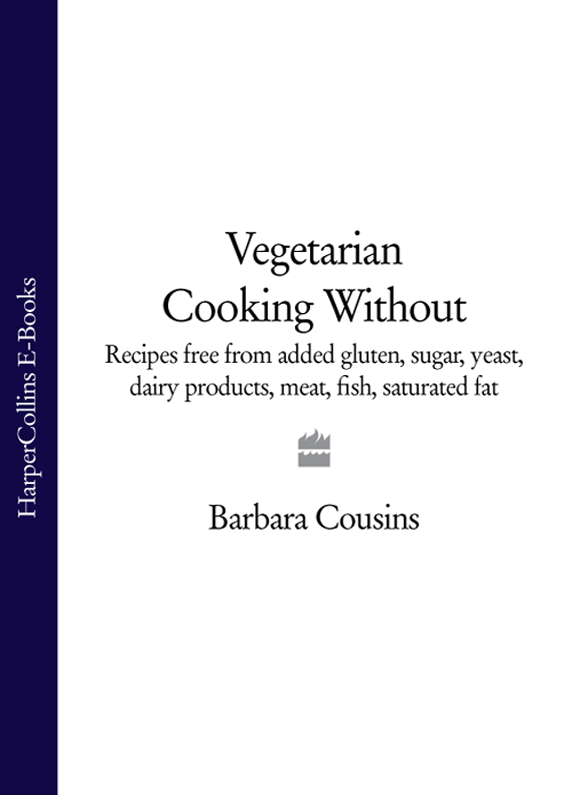Contents
Following the success of my first volume of Cooking Without, I was asked to write a follow-up. I decided that this time I would write a vegetarian version, mainly because good vegetarian recipes are harder to find when avoiding the use of cream, cheese, wheat etc. I know that many individuals who enjoyed the recipes in my first book have been requesting more, so here they are. I must admit that I quite impress myself at times when I create wonderful new dishes without the use of so many foods that seem essential ingredients in many peoples diets. It just goes to show that eating can be a pleasure even for those on restricted regimes.
Although I have written a little about the reasons for cooking without certain foods, I didnt want to make this text a repeat of my first book because there is so much more I want to say. Being in practice as a nutritional therapist I am continually learning new information and I would like to impart some of this information to you. I have had lots of feedback about the introductory section in Cooking Without and the consensus of opinion seems to be that it is a simple and common sense approach to health and healing. I would like this volume to continue that approach in some new areas of understanding.
Food is a serious business. We are what we eat and food is our fuel. Yet, it is only in the last few years that food has finally begun to be recognised in the West as being an important aspect of health and healing. Naturopaths and nutritional therapists have always been aware of the effect of diet, not only on our physical health but also on our mental and emotional wellbeing. There has, however, been a reluctance by many people to accept this. Diet is the foundation of our health, we cannot abuse our bodies by feeding it a poor diet and then expect therapists or doctors to be able to make us better.
Since the advent of modern agriculture and food processing techniques, our diet has moved further and further away from the natural foods which have sustained traditional communities all over the world for centuries. Individuals in such communities live on a mainly vegetarian diet of whole grains, beans, locally grown vegetables and fruits with small quantities of meat and fish eaten when available. Nowadays meat, sugar and fat consumption has generally taken over from traditional diets and the consumption of vegetables, fruit, grains and pulses has substantially declined. Added to this is the fact that most of the food on supermarket shelves bears little or no resemblance to its origins. It has been over-processed, coloured, flavoured, textured, preserved, packaged, flown half way round the world and will probably keep for years. Good food goes off. The trick is to eat it before it does.
A healthy eating lifestyle starts with recognising that symptoms of illness dont just happen they are the bodys way of letting us know that all is not well and we have had a hand in creating the problem. Illness represents an invitation to change to a healthier way of living which will not only renew our physical bodies but will calm the mind and the emotions as well.
It really is wonderful at last to see so many people taking responsibility for their own, and their familys, health. For too long there has been a mystical they. They wouldnt let us eat food that was harmful. They should provide us with the drugs or operations to heal us. Unfortunately, they are often more concerned with their profits, or their power, rather than with our health.
Vegetarianism and Detoxification
Research shows that eating a vegetarian diet improves ones chance of avoiding many serious health problems, but that is only the case if you eat a wholesome vegetarian diet. I remember once employing two workmen one of whom told me he was a vegetarian. At lunchtime they disappeared and I saw them sitting outside in their van eating lunch. As it was a miserable cold day, I went outside to invite them in. The vegetarian was eating chips with white bread, the non-vegetarian was tucking into a tuna rice salad with wholemeal bread which he had prepared that morning!
Eating a wholesome vegetarian diet encourages toxicity to be removed from the body. If you study the diagram below you will see meat, fish, eggs etc, at one end of a sliding scale, while fruit and salads and vegetables are at the other end. Those foods on the left side of the scale help to keep toxicity in the body and will even be craved to push toxicity back in if it comes out too quickly. At the other end of the scale are, first of all, the fruits. Fruits pull toxicity out of the cells, though not necessarily out of the body. In the past, fruit fasts were recommended by naturopaths as a therapy to cure ill health. Nowadays, however, most peoples bodies, and in particular their livers (the main organ of detoxification), are too suppressed to cope with the sudden surge of toxicity which comes out of the cells when eating lots of fruit and fruit juices. This means that individuals these days often feel too ill on a fruit fast to be able to continue. Raw vegetables and salads are the next most eliminative foods, followed by cooked vegetables, which still eliminate but in a less aggressive way than fruit or even salads. Leafy green vegetables are stronger eliminators than root vegetables.
In the middle of the sliding scale are the grains and it is here where we find a balance between the amount of toxicity pulled out of the cells and that eliminated to the outside world. Grains, such as rice, millet, quinoa and buckwheat, are superb at soaking up toxicity and helping to remove it from the body. They are also excellent at supporting the blood sugar in order that the body has sufficient energy to remove the toxicity. The art of staying healthy is to find our own individual balance along the sliding scale. Generally this means eating lots of foods from the middle section, such as grains, pulses, beans and vegetables, with foods from either end being added in more limited quantities to add interest and flavour to our diet. This fine balance of health is a little like a see-saw and it is important to listen to our bodies on a daily basis in order to discover how to adjust our diets in order to maintain this balance. Too little of the right food and we stay where we are, entrenched in our illness and emotional pain; too much detoxification and we eliminate toxicity too quickly causing us more illness and emotional pain.
Pulling too much toxicity out of the cells but not out of the body is one reason why individuals often feel ill when starting a healthy eating regime. The same effect can occur when introducing minerals in supplement form, as these also encourage toxicity to move out of the cells. I always suggest that anyone changing their diet does so gradually and that supplements are also introduced gradually. In this way one obtains balance and can feel quite well while removing toxicity from the body. There is no benefit to be gained by trying to speed things up, as our livers determine how fast we can detoxify. Unfortunately, today, many peoples livers are so overworked dealing with the toxicity in food and the atmosphere, not to mention high-fat diets, unexpressed emotions, suppression from drugs and alcohol etc., that they have to be encouraged to eliminate toxicity. If we try to go faster than the liver can manage, then the toxicity backs up in the blood stream making the individual feel poorly. It can lead to an exacerbation of original symptoms or new symptoms can appear such as headaches, aching limbs, tiredness, stomach upsets or even mental and emotional symptoms such as anger or depression. Sometimes, the body will catch an infection to try to throw off the excess toxicity to the outside world.

